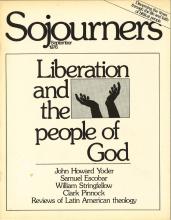In preparation for the Assembly of the Commission on World Missions and Evangelism of the World Council of Churches held in Bangkok, a collection of documents was circulated in March 1972 under the heading, Salvation Today and Contemporary Experience. In the Introduction to the collection, written by Thomas Wieser, we read:
The contemporary quest for liberation, whether political, economic, cultural or personal, has for many Christians become the context for the Church's mission and its proclamation of salvation. The biblical story, too, especially in the Old Testament, is to a large extent a story of liberation. A number of interpreters see in this affinity a direct scriptural support for the present quest, contending that the biblical meaning of liberation must not be allowed to be "spiritualized." Others, however, warn that the Bible cannot be used to support what they believe to be a mere temporary political struggle.
My good friend Tom Wieser is right; the dominant vogue of "with-it" theology since the late 1960s has been centered on liberation as the purpose of God. It seemed self-evident to many that the dominant biblical image is that of Exodus and that by taking off from the event of Exodus it would be possible in some broad sense to have a "biblical basis" for an especially committed Christian involvement in the political struggles of our age.
There have been a few thinkers asking careful questions about this very popular approach. Jose Miguez Bonino, for instance, has asked why it should be so obvious that out of the total biblical heritage it should be dominantly or even exclusively the picture of Exodus which becomes illuminating and motivating without equal reference to exile, captivity, cross, the giving of the law, the taking of the land, the scattering of the faithful, or other major themes of the biblical witness.
Read the Full Article

